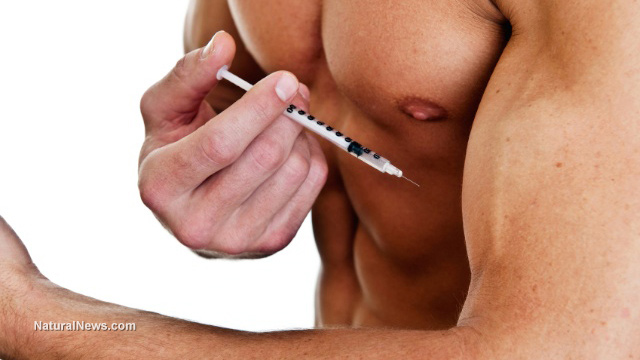FDA: Testosterone supplements can cause heart failure, stroke, depression, liver toxicity, insomnia and more
Wednesday, November 09, 2016 by: David Gutierrez, staff writer
Tags: testosterone, FDA, dangers

(NaturalNews) Testosterone replacement or supplementation products can cause dangerous side effects, including heart attacks, infertility, personality changes and chemical dependency, the FDA has warned.
The agency announced that it is updating the warning labels on all testosterone products.
"The new warning will alert prescribers to the abuse potential of testosterone and the serious adverse outcomes, especially those related to heart and mental health that have been reported in association with testosterone/anabolic androgenic steroid [AAS] abuse," the FDA said.
The FDA drew particular attention to the millions of people who use testosterone therapy off-label, either for body-building uses, or in the hopes of boosting general health or libido. These uses are dangerous and not supported by evidence, the agency warned.
"There's been a very successful advertising campaign to make men feel that whatever their problem is, the answer is to buy more testosterone," said Dr. Sidney Wolfe of Public Citizen, when the FDA issued its first warning about off-label testosterone use.
Testosterone and AASs (synthetic forms of the hormone) are FDA approved to treat only certain conditions, such as delayed puberty, muscle loss due to cancer, AIDS or other diseases.
Shrinking testicles and heart attacks
The new labels on testosterone products will add a further warning about the potential for abuse and for serious adverse outcomes, particularly related to cardiovascular and mental health. The existing Warnings and Precautions section will remind prescribers of the importance of measuring circulating blood levels of testosterone in people suspected of abusing the drugs. The Abuse and Dependence section of the label will also be updated to reflect recent research about the risks of testosterone and AAS abuse."Abuse of testosterone, usually at doses higher than those typically prescribed and usually in conjunction with other AAS, is associated with serious safety risks affecting the heart, brain, liver, mental health and endocrine system," the FDA said.
The FDA lists potential side effects, including heart attack, heart failure, stroke, liver toxicity, kidney failure, shrinking testicles, male infertility, baldness, depression, hostility and aggression.
The agency also warns that testosterone abuse can produce chemical dependency (addiction). This produces withdrawal symptoms, including irritability, depression, insomnia, lowered libido, loss of appetite and fatigue.
According to the National Institute on Drug Abuse, "Long-term steroid abuse can act on some of the same brain pathways and chemicals — including dopamine, serotonin and opioid systems — that are affected by other drugs. This may result in a significant effect on mood and behavior."
Big Pharma windfall
Last year, the FDA warned that doctors were over-prescribing testosterone for uses that are not supported by evidence. The new warning strengthens this caution, classifying such uses as abuse on par with taking steroids for athletic purposes.In recent years, Big Pharma has embarked on a massive marketing campaign claiming that a wide variety of vague health problems or age-related complaints are actually caused by low testosterone. Because treating clinically-proven low testosterone is an FDA-approved use, this marketing is legal under U.S. law.
But studies show that among the millions of men taking testosterone pills, gels or injections for "benefits" such as improved alertness, energy, mental sharpness or libido, a quarter were never even given a blood test to establish whether they actually have low testosterone.
The number of men taking testosterone supplements increased 75 percent from 2009 to 2013. The industry now rakes in $2 billion per year.
Even among men who have had their blood tested, testosterone might not be the best choice. Lower than average levels are not necessarily a sign of a health problem. Additionally, hormone supplementation comes with serious risks that may outweigh the benefits – "benefits" that have never been proven in controlled studies.
"Because of the marketing, men have been flooded with information about the potential benefit of fixing low testosterone, but not with the potential costs," said Harvard endocrinologist Carl Pallais. "Men should be much more mindful of the possible long-term complications."
Sources for this article include:
MedicalXpress.com
NBCNews.com
FDA.gov
CapitalWired.com
NBCNews.com
Health.Harvard.edu
Testosterone at FETCH.news
Get independent news alerts on natural cures, food lab tests, cannabis medicine, science, robotics, drones, privacy and more.
Take Action: Support Natural News by linking to this article from your website
Permalink to this article:
Embed article link: (copy HTML code below):
Reprinting this article:
Non-commercial use OK, cite NaturalNews.com with clickable link.
Follow Natural News on Facebook, Twitter, Google Plus, and Pinterest
- Newly released JFK files reveal Pentagon's role in creating Lyme disease and covid in the same lab
- The hidden dangers in your kitchen: How cooking methods impact diabetes, cancer and aging
- DEADLY DECEPTION: How COVID vaccines increased mortality rates and why authorities hid the truth
- CDC finally halts $11 billion COVID funding scam as health officials admit the ‘pandemic’ was a fraud
- Arkansas embraces medical freedom with landmark ivermectin law
- Home gardening for preppers: A beginner's guide to growing your own food
- Lab leak confirmed? Boris Johnson's stunning reversal on COVID origins sparks global debate
- GAIN-OF-FUNCTION CAT-BIRD-FLU now on the rise as nearly a dozen cats in Colorado "test positive" for Bird Flu due to contaminated cat food
- Unraveling the paradox: Why intelligent individuals fall prey to everyday blunders
- Cartels shift tactics: Kidnappings and organ trafficking surge as border crossings plummet under Trump policies
- Why you should think twice before buying mainstream toothpaste formulas
- Was JFK's assassination orchestrated by a CIA double agent? New evidence points to James Angleton as the “architect”
- “Rent-a-womb” scandal: How China is exploiting U.S. birthright citizenship for long-term espionage
- Key nodes of Federal Government censorship
- Trump's greatest betrayal so far: Accelerating Middle East wars, silencing dissent, and serving Zionist masters
- ATTENTION PRESIDENT TRUMP: Please WITHDRAW your nomination of Dr. Susan Monarez for CDC Director as she is a VAX FANATIC and TOXIC JAB ZEALOT
- Record honeybee deaths devastate U.S. agriculture, pesticides under scrutiny
- Speaker Johnson warns Congress may defund or disband rogue courts targeting Trump
- Newly released JFK files reveal Pentagon's role in creating Lyme disease and covid in the same lab
- Elon Musk: Aliens could be here on Earth RIGHT NOW
- Festive flavors: The sweet history, nutritional profile and health benefits of pecan pie
- Trump reverses course on Gaza plan, says “nobody is expelling Palestinians”
- Reclaim your health: How midlife exercise reverses years of inactivity
- Big Pharma's $8 Billion bribery scheme exposed: how doctors are pushed to prescribe junk science, not heal
- Boys are back in town: Trump’s patriotic alpha crew takes the wheel while toxic females ride in the backseat
- EPA advisor admits the agency is funneling billions to climate groups ahead of Trump’s return to White House
- Space war brewing? Russia threatens to destroy Starlink satellites
- Survival 101: Effective EMF blocking techniques
- A lack of integrity in Academia: Harvard professor found GUILTY of fraudulent research to promote CRT theory
- Mike Adams Sermon 66: God will DESTROY ISRAEL for its wickedness
- 5 Simple steps to boost your brainpower: How to strengthen executive function in a distracted world
- Rep. Nancy Mace introduces bill to ban biological males from female facilities on federal property
- Sugarcane extract superior to cholesterol-lowering drugs?
- WHO focusing more on policing speech about public health and implementing global surveillance systems
- Pilots report mysterious lights 'moving at extreme speeds' across Oregon skies
- Dr. Mike Yeadon releases 15-minute testimony - WATCH - about genocidal intent of COVID “vaccines”
- EPA advisor admits the agency is funneling billions to climate groups ahead of Trump’s return to White House
- The Health Ranger releases “Vaccine Zombie” song and music video, using AI-animated zombies for the music video
- California's social media censorship law struck down: A victory for free speech or a threat to online safety?
- Dr. Mike Yeadon releases 15-minute testimony - WATCH - about genocidal intent of COVID “vaccines”
- The pandemic as a tool for INDOCTRINATION: Understanding “The Indoctrinated Brain” by Dr. Michael Nehls
- Florida takes a stand: DeSantis proposes permanent ban on mRNA vaccine mandates
- Mike Adams releases country western hit single: Goin’ Back in Time is Comin’ Home
- Mike Adams releases music poetry sensation: A Child of God
- “Why we influenced the 2020 elections”: Facebook files reveal the coordinated effort to bury the Hunter Biden laptop story
- RFK Jr. clears key hurdle: Sen. Susan Collins backs controversial HHS nominee, signaling a new era for health policy
- Unpacking the Lies That We’ve Been Fed – new song and music video released by Mike Adams, the Health Ranger
- Mike Adams releases new song and music video: Nothing More Disgusting Than a Globalist
- Newly released JFK files reveal Pentagon's role in creating Lyme disease and covid in the same lab
- Congratulations to the FULLY UNVACCINATED as you resisted the COVID-19 PROPAGANDA MACHINE fueled by over $100 BILLION
- Michigan sheriff announces criminal investigation into 2020 election crimes, Dominion Voting Systems
- Israeli soldiers accused of even more torture and abuse in the West Bank
- Migrants are taking advantage of recent hurricanes to scam residents and loot their homes
- House Intelligence Committee calls for the ARREST and PROSECUTION of Dr. Anthony Fauci
- Red Cross issues warning to stop blood plasma donations from vaccinated people
- Scientists confirm: GENIUS brain function can be spontaneously unleashed in humans without any apparent cause
- EPA advisor admits the agency is funneling billions to climate groups ahead of Trump’s return to White House
- HYSSOP: What research reveals about the health benefits of this ancient holy herb
- Two containers with completed ballots fall out of truck in Florida
- Fully vaccinated about to see “tsunami” of illness and death, warns virologist
- Global leaders unite to clamp down on “misinformation” with UN-backed Cascais Declaration
- BREAKING: 2025 NDAA authorizes mandatory military draft of WOMEN across America… as Pentagon pursues global NUCLEAR war with both Russia and China at the same time
- Michael Yon warns of a ZIONIST TAKEOVER in Trump’s second administration
- BOMBSHELL: DNA testing kits are a SCAM to develop ethnic-specific bioweapons
- Ozempic and Wegovy weight loss drugs are injectable LIZARD VENOM PEPTIDES that may unleash a devastating wave of organ failure… side effects align with symptoms of SNAKE BITES
- Israeli soldiers accused of even more torture and abuse in the West Bank
- These 13 countries just signed an agreement to engineer a global FAMINE by destroying food supply
- NASA admits that climate change occurs because of changes in Earth’s solar orbit, and NOT because of SUVs and fossil fuels
- RFK Jr. clears key hurdle: Sen. Susan Collins backs controversial HHS nominee, signaling a new era for health policy
- Sermon 30: How Jesus reveals Caesar’s FAKE CURRENCY and FALSE AUTHORITY
- Coriander seeds: Ancient medicine backed by modern science
- Arizona officials claim Maricopa County needs 10-13 days to tabulate results of the election
Science News & Studies
Medicine News and Information
Food News & Studies
Health News & Studies
Herbs News & Information
Pollution News & Studies
Cancer News & Studies
Climate News & Studies
Survival News & Information
Gear News & Information
News covering technology, stocks, hackers, and more



"Big Tech and mainstream media are constantly trying to silence the independent voices that dare to bring you the truth about toxic food ingredients, dangerous medications and the failed, fraudulent science of the profit-driven medical establishment.
Email is one of the best ways to make sure you stay informed, without the censorship of the tech giants (Google, Apple, Facebook, Twitter, YouTube, etc.). Stay informed and you'll even likely learn information that may help save your own life."
–The Health Ranger, Mike Adams












































